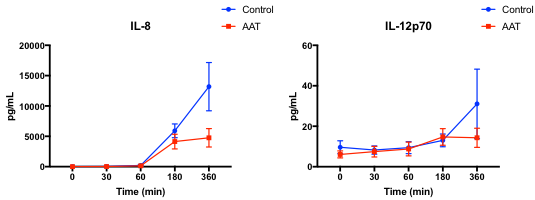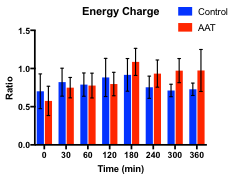Alpha-1 Antitrypsin Reduces Liver Ischemia Reperfusion Injury during Ex-Vivo Normothermic Machine Perfusion
1Massachusetts General Hospital, Boston, MA, 2Kamada, Rehovot, Israel
Meeting: 2019 American Transplant Congress
Abstract number: A92
Keywords: Donors, marginal, Inflammation, Liver preservation, Machine preservation
Session Information
Session Name: Poster Session A: Ischemia Reperfusion & Organ Rehabilition
Session Type: Poster Session
Date: Saturday, June 1, 2019
Session Time: 5:30pm-7:30pm
 Presentation Time: 5:30pm-7:30pm
Presentation Time: 5:30pm-7:30pm
Location: Hall C & D
*Purpose: Normothermic machine perfusion is an emerging preservation method in liver transplantation with vast potential as a platform for ex-vivo graft reconditioning. Alpha-1 Antitrypsin (AAT) is an acute phase reactant with potent anti-inflammatory, anti-apoptotic and immunomodulatory properties. We evaluated the efficacy of AAT administered during NMP to mitigate ischemia reperfusion injury in human liver grafts.
*Methods: 5 deceased donor livers were included (4 DCD, 1 DBD). Each liver was surgically split into left and right lobes. The hepatic artery, portal vein and common bile duct were cannulated and the lobes were perfused separately at 37°C for 6 hours. Plasma-derived AAT (Glassia, Kamada) was added to the perfusate of one lobe with the opposite lobe perfused as an untreated control.
*Results: Arterial resistance decreased in both AAT-treated and control lobes, with a comparatively lower resistance observed in the four DCD AAT-treated lobes. Total blood flow was higher in AAT-treated lobes, reaching significance at hour 6 of perfusion. Perfusate AST levels were significantly lower in AAT-treated lobes at all time points.
Pro-inflammatory cytokine (IL-8 and IL-12p70) release was significantly lower in AAT-treated lobes.
Energy charge, the cumulative ratio of high energy to low energy nucleotides, was similar between lobes for the first 3 hours of perfusion, then higher in AAT-treated lobes for the final 3 hours, indicating superior energy restoration in treated lobes.
*Conclusions: In an experimental split liver model, the addition of AAT during perfusion had beneficial effects on hemodynamic parameters, particularly in DCD livers. AAT treatment also resulted in lower levels of hepatocyte injury and blunted release of inflammatory cytokines while improving energy restoration.
To cite this abstract in AMA style:
Detelich D, Vries Rde, Carroll C, Stein M, Uygun K, Yeh H, Markmann J. Alpha-1 Antitrypsin Reduces Liver Ischemia Reperfusion Injury during Ex-Vivo Normothermic Machine Perfusion [abstract]. Am J Transplant. 2019; 19 (suppl 3). https://atcmeetingabstracts.com/abstract/alpha-1-antitrypsin-reduces-liver-ischemia-reperfusion-injury-during-ex-vivo-normothermic-machine-perfusion/. Accessed February 9, 2026.« Back to 2019 American Transplant Congress



